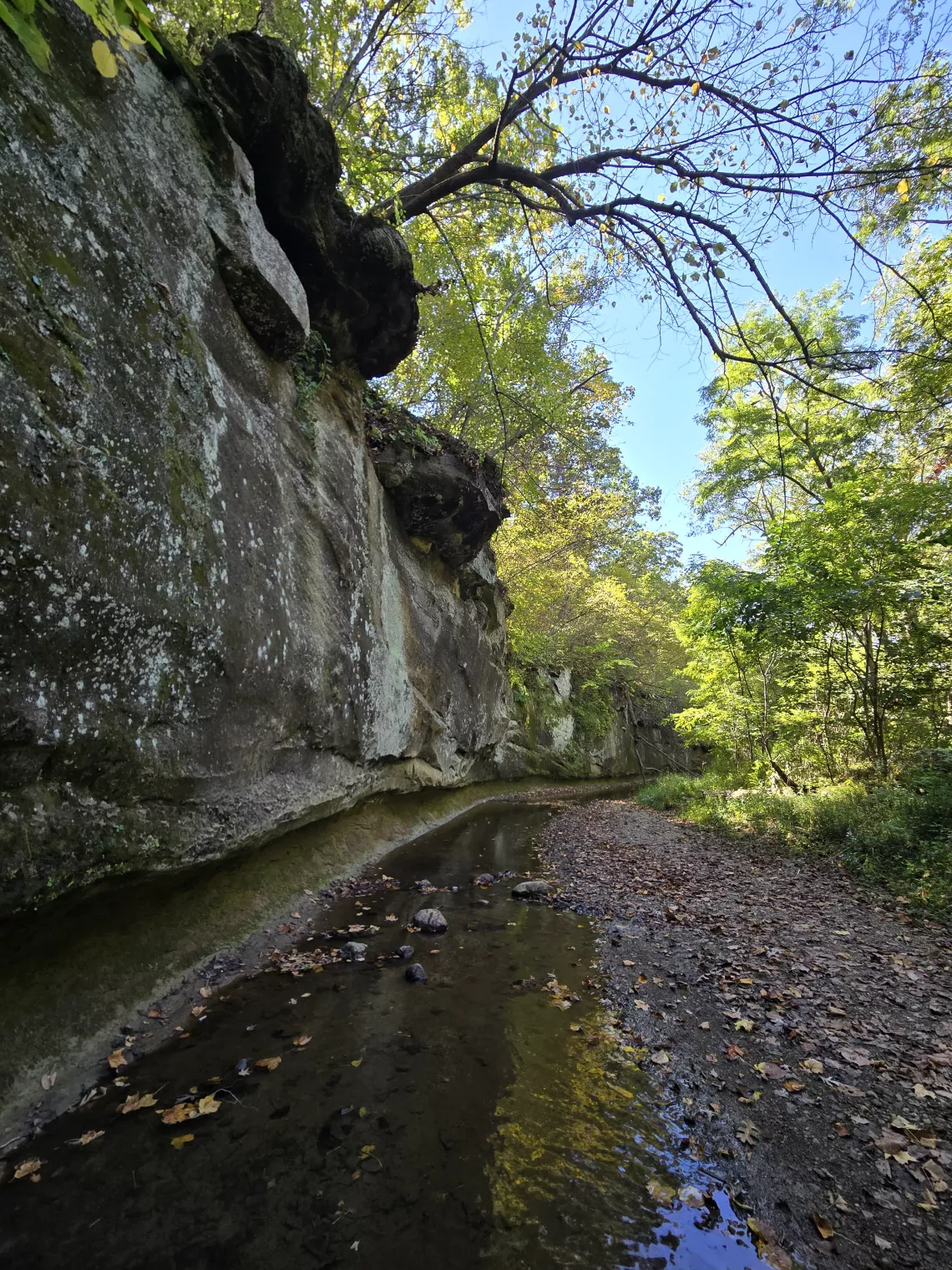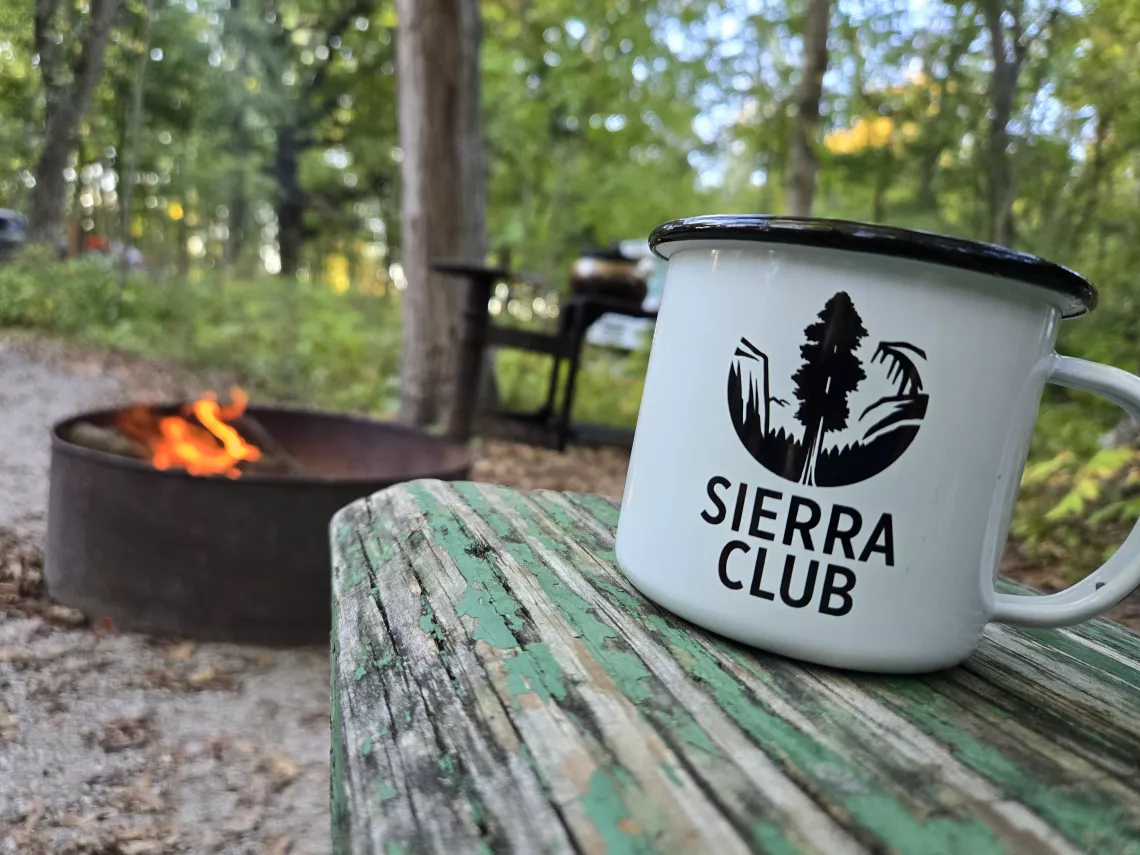Fall is upon us. I hope you can take some time to enjoy the turning leaves and the remaining days of fall. Most importantly, this is election season. It is time to vote; your vote is important.
Pam Mackey Taylor, Newsletter Editor
What you can do to help the environment
- Vote in this year's election.
- Plan on attending our book discussion on "Crossings - How Road Ecology is Shaping the Future of Our Planet" by Ben Goldfarb, December 3, 7pm.
- If you have a private well, have the water tested for nitrates. Contact your county public health department to determine where to take your water for testing.
- Donate to the Iowa Chapter of the Sierra Club so that we can continue our work on protecting Iowa's environment.
In this issue of the Iowa Sierran
Protecting the Environment
-
Call to Action - Iowa’s environment is facing significant challenges and a significant drop in state revenue makes things even more challenging.
-
Book discussion on "Crossings - How Road Ecology is Shaping the Future of Our Planet" by Ben Goldfarb, December 3, 7pm.
CO2 Pipeline Update
-
Summit Fined $10,000 for Acquiring Easements Before the Informational Meetings
Climate Change
Plus
-
Lunch and Learns Fridays at noon
-
Contribute to the Iowa Chapter
-
Volunteer for the Iowa Chapter
-
Calendar of events
-
To see the archive of previous Iowa Chapter newsletters
Call to Action
by Pam Mackey-Taylor, Iowa Chapter Director
Iowa’s environment is facing significant challenges and a significant drop in state revenue makes things even more challenging.
REAP, the state program that supports state and county parks, is expiring in 2026. It started out with an authorization at $30 million. That was later reduced by the legislature to $20 million. We have never seen REAP fully funded at its authorized amount - lately it has been $12 million a year. The money authorized for open spaces is regularly moved to $0 or is allocated to some special need. REAP was given extensions, which brings us to 2026. Note fiscal year 2026 starts on July 1, 2025. I expect a battle at the legislature over REAP in 2025.
We are expected to fight over the park lands held by the Iowa Department of Natural Resources in 2025. This year, the opponents got farther than ever before in restricting park land held by the DNR. It was a hard-fought battle. The opposition in both chambers is claiming that the DNR is unable to maintain the property they have and they have acres of weeds (we call those weeds prairie). And I expect a battle over public lands in the 2025 legislature.
Given the current laws on Iowa's income tax rates, Iowa's treasury is expected to fall to 50% of its current annual revenue. Every nook and cranny receiving state funds will be under scrutiny. Some of that has already started. Two boards (Natural Resource Commission, Environmental Protection Commission) connected with the Department of Natural Resources have lost their ability to oversee the DNR budget.
The State Preserves Advisory Board was put out of business this year. And the last vestiges of the Leopold Center for Sustainable Agriculture board were put out of business this year.
It is expected that I-Will will be introduced next year – the 3/8 cent sales tax that will support outdoor recreation and water quality. The chatter is that the current DNR funding will be replaced by I-Will. By the way, use taxes are not the same as sales taxes. The tax on internet sales will not go to I-Will since it is called a use tax. There will be tremendous pressure to change funding formulas. There will be an effort to move most of the funding in the direction of the ineffective Nutrient Reduction Strategy and away from our traditional parks and recreation.
We have seen a steady decline in funding for water sensors.
Park rangers lost their housing inside the parks. The number of rangers has been reduced. Fish hatchery managers lost their housing this year.
I could go on and on, but let me summarize by saying that the pieces and parts are in place to do significant damage to the natural areas in the state and the programs that support them.
If it sounds like the house is burning, it is. It is going to take each and every one of us in the next year to fight for and advocate for Iowa’s parks and recreation areas, for clean water, and for protecting the environment.
- Talk to your neighbors, relatives, and friends about environmental issues.
- Volunteer to work on political campaigns.
- Vote in the November election.
- The work doesn’t end at the election – we need to be vigilant during the legislative session.
- Let your state senator and representative know your feelings about environmental issues.
- Go to forums, write the legislators, respond to action alerts about issues coming before the legislature.
- You can even go to the Capitol and talk with your legislators.
Democracy is not a spectator sport. This is going to require some heavy lifting, but we have done it before. After all, we voted for I-Will, we have been able to retain our park and recreation lands, we have kept REAP alive. And we can work together in 2025 to protect our environment and public lands.

Photo of Ledges State Park by Jess Mazour.
Summit Fined $10,000 for Acquiring Easements Before the Informational Meetings
In August, Summit Carbon Solutions announced that it had acquired the easements that Navigator Heartland Greenway had obtained from landowners before Navigator abandoned its carbon dioxide pipeline project. This transaction violated the Iowa law. Section 479B.4(6) states that a pipeline company cannot purchase an easement or other interest in land before an informational meeting is held. But Summit’s acquisition of the Navigator easements occurred before the informational meetings.
The informational meetings for phase 2 of the Summit CO2 pipeline projects were completed in August and September, all after Summit announced its purchase of the easements.
Because Summit had violated the law, Bremer County filed with the Iowa Utilities Commission (IUC) a motion to declare the easements illegal and to require Summit to renegotiate the easements. Because Bremer County could file its motion only in the docket pertinent to the portion of the pipeline in Bremer County, Sierra Club filed a similar motion in all of the IUC dockets.
On October 7, the IUC issued an order declaring that Summit had indeed violated the law in obtaining easements before the informational meetings were held. Summit was ordered to pay a $10,000 penalty.
Unfortunately the easements were not invalidated. We had hoped that if Summit were required to renegotiate the easements, the landowners, now armed with more knowledge, would not sign easements. At this point, it is not clear how many easements Navigator sold to Summit.
Hopefully, Summit will now understand that it must follow the law in all respects.
ADM CO2 Sequestration Site Has 2 Leaks
The nation's first permitted commercial carbon dioxide (CO2) sequestration site, owned by ADM in Decatur, Illinois, has not one, but two, leaks. ADM knew something was wrong for months, but the Environmental Protection Agency (EPA) and the public just found out recently.
This disaster points to the serious risks of CO2 leaking into water resources. Supercritical CO2 and water create carbonic acid, which can leach toxic minerals from surrounding rocks into the water. That could contaminate drinking water sources for those who rely on that groundwater, including private wells and municipal drinking water utilities.
During the sequestration process, supercritical CO2 is injected into permitted underground pore space. The CO2 is supposed to stay in the authorized zone. Unfortunately, the carbon dioxide did not stay in the authorized zone.
In September, 2020, one of ADM’s two monitoring wells began to malfunction and by January, 2022, was completely malfunctioning. ADM identified the first leak in March 2024. It wasn’t until July 31, 2024, that ADM finally notified EPA of the leak. The public did not find out about the leak until September when the EPA mandated additional testing. During that additional testing, a second leak was detected.
This leak raises serious problems with an under-regulated, rapidly expanding industry. What are the reporting requirements for problems? What type of monitoring is needed to ensure CO2 is not leaking into unauthorized zones? Who is liable when something goes wrong?
The Dirty Truth About Utility Climate Pledges
The 50 utility companies in the U.S. most invested in fossil fuels are planning to replace just half of their existing fossil fuel generation with clean energy by 2035, according to the Sierra Club’s 2024 Dirty Truth Report released this month.
Utilities scored an overall grade of 'D,' or 29 out of 100, in the report, only improving their overall score by 12 points since 2021, the first year Sierra Club conducted the analysis.
The Sierra Club’s annual Dirty Truth Report, supported by Bloomberg Philanthropies’ Beyond Carbon, analyzes the plans of 75 utilities in the U.S. owned by 50 parent companies and assigns scores and grades to the utilities based on three criteria: plans to retire polluting coal plants by 2030, whether they plan to build new gas power plants through 2035, and the scale of their plans to develop clean energy through 2035. In an interactive webpage, users can see their utility’s score and what progress–if any–the utility has made toward transitioning to cleaner, more affordable energy since the first version of the report in 2021.
The Inflation Reduction Act (IRA) of 2022 continues to reduce the cost of clean energy while creating hundreds of thousands of jobs. Wind and solar energy overtook coal in power generation through the first half of 2024 and are expected to continue their progress for the rest of the year, a major milestone for the power sector. But many utilities are lagging behind, deploying wind and solar too slowly while hanging on to dirty, expensive coal plants.
Although clean energy is less expensive than 99 percent of existing coal and new gas generation, only 20 of the 75 utilities have plans to be entirely coal-free by 2030. The utilities in the report are also planning to build 93 GW of new gas capacity through 2035. More companies are planning new gas plants, and the amount of planned gas per year is higher than in any previous version of our report, indicating a troubling trend among these utilities.
“Despite their promises, utilities are still lagging on delivering clean energy,” Sierra Club Executive Director Ben Jealous said. “This is the fourth year we’ve released this report, and utilities have made nowhere near enough progress to protect our health and safeguard our collective future. Burning fossil fuels is expensive, inefficient, and dangerous, and utilities have kicked the can down the road for years by delaying their plans for a clean energy future. Now, utilities have an opportunity to do better by their customers and communities across the country by investing in safe, reliable, affordable clean energy.”

“Even with the clear economic and environmental benefits of clean energy, the dirty truth is that utilities continue to prioritize fossil fuels over the health of our planet and people,” said Antha Williams, who leads the Environment program at Bloomberg Philanthropies. “With the incentives from the Inflation Reduction Act and rapid advancements in clean energy technology, transitioning to renewable energy is easier than ever. It is imperative for utilities to step up and deliver reliable, affordable, and clean energy for all.”
Book discussion - "Crossings" on December 3
On December 3 at 7pm, Sierra Club members David Hoferer and Tom Reardon will be discussing the book "Crossings - How Road Ecology is Shaping the Future of Our Planet" by Ben Goldfarb. RSVP today and we will send you the Zoom link.
Our road infrastructure has been the source of significant loss of wildlife across the country, resulting in deaths and disruption of their lives. Roads have interrupted migration patterns. They interfere with animals that want to move back and forth to nesting grounds. Furthermore, people and their vehicles are at risk from collisions with wildlife attempting to cross roads. The book also explores ways that the fragments of habitat can be reconnected. Throughout the book Ben Goldfarb addresses the issue with humor and great insight.
We hope you can join us on December 3 at 7pm. RSVP today.

Photo: oak galls floating on water, courtesy of Jess Mazour.
Lunch and Learns Fridays at noon
Fridays at noon, we do a Lunch and Learn livestream. See us on Facebook at "Sierra Club Iowa Chapter". These will be recorded so you can watch them anytime. Topics will be selected based on what is happening during the week. During the legislative session, we cover issues coming before the Iowa legislature.
In case you missed our past webinars and lunch and learn sessions, you can still see them.
- View "White House Environmental Justice Advisory Council Recommendations: Carbon Management", October 18, 2024
- See "Stop Summit's Surveys at the Iowa Supreme Court", October 11, 2024
- See "2nd CO2 Leak at ADM Sequestration Site", October 4, 2024
- Watch "Stop Summit's Surveys at the Iowa Supreme Court!", September 27, 2024
- View "ADM Sequestration Site Leak", September 20, 2024
Volunteer for the Iowa Chapter
Almost everything we do is done by volunteers like you. If you would like to volunteer for the Iowa Chapter, please let us know by sending an E-mail to Iowa.chapter@sierraclub.org. Or sign up by using the online form. There are many opportunities for you to make a difference:
-
making phone calls
-
developing graphics for banners and flyers
-
working on legislative issues
-
working on elections
-
fundraising
-
organizing events
-
joining an issue committee
If you would like to join our legislative action team, sign up here. Keep on top of what is happening at the Iowa legislature. Be alerted when you should contact your legislators about pending legislation.

Photo: camping by Jess Mazour.
Contribute to the Iowa Chapter
Sierra Club - working every day on Iowa’s environmental problems
Sierra Club is Iowa’s oldest and largest grassroots environmental organization. Not only that, we are the best bet in the state for achieving bold solutions to Iowa’s environmental problems.
We work in the courts, before Iowa’s public agencies, and in the halls of the legislature. The Iowa Chapter's effort to protect the environment takes financial support. The Chapter receives very little financial support from the national Sierra Club. Can we count on you for a donation to ensure even more victories? Your contribution will be put to work here in Iowa on issues that affect every day Iowans – water quality, clean air, protection of Iowa's soil, parks and natural areas, and a strong democracy. The Iowa Chapter is relentless in fighting back bad legislation that affects every one of us.
Your non-deductible contributions make it possible for us to fight bad legislation and to promote good legislation. We appreciate your past and on-going support of these efforts. You can make a non-deductible donation with a credit card. A non-deductible donation supports the Chapter's effective, citizen-based advocacy and lobbying programs. If you prefer, a non-deductible check can be written to the Sierra Club Iowa Chapter and mailed to:
Treasurer
Sierra Club, Iowa Chapter
PO Box 1058
Marion, IA 52302
You can also make a tax-deductible donation with a credit card. Tax-deductible activities are limited to public interest education, research and legal actions. A deductible check can be written to the Sierra Club Foundation with “Iowa Chapter” written in the memo line.
Thank you for your support.
Donate your used vehicle
As the Sierra Club Foundation's Iowa Chapter continues to raise charitable funds to support its work in Iowa, won’t you consider participating in our vehicle donation program? Our partners over at CARS have made the process of donating your unused or unneeded car, truck, motorcycle, boat or RV easy, efficient and secure. They’ll take care of everything from picking up your vehicle to sending you a tax receipt for your generous gift. To learn more about The Sierra Club Foundation's Iowa Chapter vehicle donation program, please call 844-674-3772. Or visit our webpage to get started today!
Sierra Club Foundation promotes climate solutions, conservation, and movement building through a powerful combination of strategic philanthropy and grassroots advocacy. The Foundation is the fiscal sponsor of Sierra Club’s charitable environmental programs.
For more information
Planned giving . . . naming the Sierra Club Iowa Chapter in your will
Ensure your environmental legacy by naming the Iowa Chapter in your will or trust. These gifts cost you nothing now. You can hold onto your assets for as long as you need them.

Thank you for supporting our work!
| When | Earliest: Latest: |
| What |
|
| Word or Phrase | Word or phrase to search for: |
| Leader | All or part of leader name to search for: |
No Matching Activities Found
Loading
| Date | Activity (click title for full description) | Sponsor | Category | Type | Difficulty | Links |
|---|
Loading ...
 Outing
Outing Club support event
Club support event  Social event
Social event  Activist event
Activist event  Multiple events (map only)
Multiple events (map only)